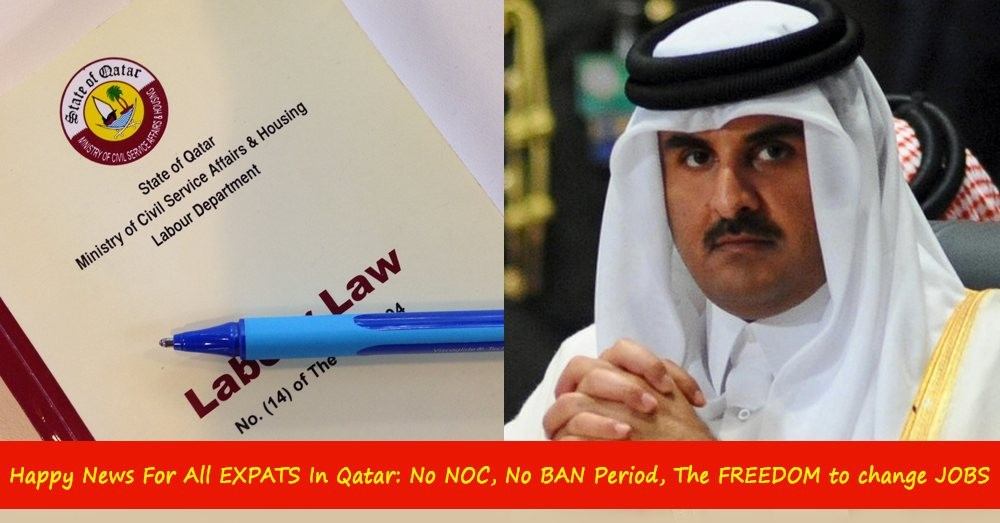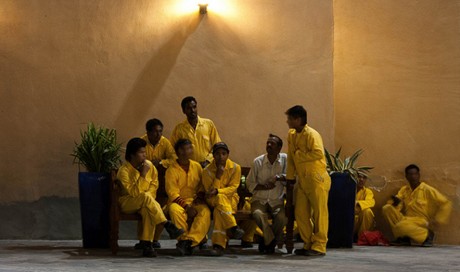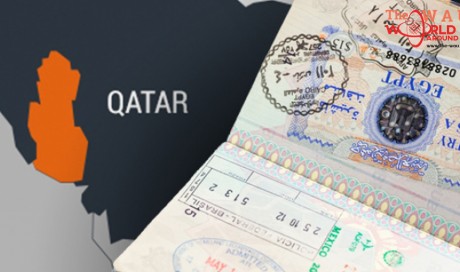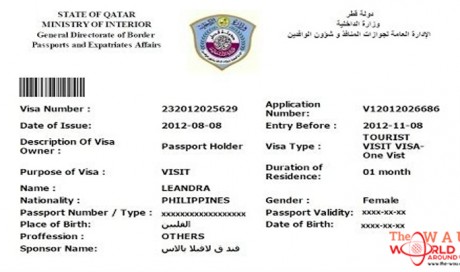Qatar has completed the preparation for the regulations of the law regulating the entry and exit of expatriates and it will come into effect from 13th of December this year.
Executive regulations are bye-laws that explain each article of a law and explain in detail how they are to be put in force.
The law (Number 21 of 2015) regulating the entry, exit and residency of foreign workers was issued late last year, amending a previous legislation.
Law Number 21 of 2015, which abolishes the stipulations of Law Number 4 of 2009 regarding Regulation of the Expatriates Entry, Departure, Residence and Sponsorship, was issued on October 27 last year.
Among other changes, the new law abolishes the current two-year ban on expatriates who want to come back to the country on a new visa. Presently it requires a no-objection certificate from the previous employer for a former resident to take up a new job in Qatar.
The new legislation will replace the sponsorship system and make the employment and stay of expatiates here entirely contract-based.
Job contract will need to be signed by a foreign worker before he lands here once the new law is in effect from later this year.
Also, employment contracts of all expatriate workers who are already here will be replaced with new contracts.
In other words, all expatriate workers will have to sign new contracts with their employers in compliance with the provisions of the new law (No 21 of 2015).
"Since the new law abolishes kafala (sponsorship system), a person who had previously worked in Qatar would not have to seek the approval of his former sponsor if he is recruited by a new employer," Brigadier Mohamed Ahmed al-Atiq, assistant-director general of the Department of Border, Passport and Expatriates Affairs, had said while explaining the salient features of the new law.
"A foreign worker who has got a new contract to work in Qatar can come back even the next day, provided he has met the other requirements like visa," he had said.
This contract will form the basis of the relationship between a foreign worker and his employer. The contract will be signed for two or five years’ duration and both the sides will be obliged to follow its clauses that will contain terms and conditions.
Once the new law is in effect, the exit permit system whereby a foreign worker needs written permission from his sponsor to travel overseas will also end.
A worker would only need to inform his employer about his departure.
According to Article 26 of the new law, if a foreign worker is fired as a punitive measure and he did not appeal his dismissal or his plea was rejected by a court, he shall not be permitted to come back to Qatar before the passage of four years.
Also, an expatriate worker repatriated upon a court verdict cannot come back unless he got the approval of the Minister of Interior.
According to the new law, expatriate workers can change jobs with government permission, either after the expiry of their contracts or after five years of service with their employer in case of open-ended contracts.
For changing of jobs before the expiry of contract, the new law stipulates that the expatriate worker has to get the approval of the employer, alongside the concerned government entities.
The new law also enables expatriate workers to apply exit permits themselves through the approved channels of the Ministry of Interior, without having to seek the permission of the employer. The request would be granted within three working days.
In cases of emergency and the mutual agreement of both the worker and the employer the exit permit will be granted immediately.
According to new law no approval from former employer is required if he is recruited by a new employer. An expat can also move to another sponsor with the approval of MOI and MOLSA if the sponsor is dead or the company no longer exists for any reason.
16 things you need to know about new law kafala changes
1. New law would be implemented by this year 2016.(updated)
2. New law will make employment and stay of expatiates entirely contract-based.
3. Two-year ban on a new work visa will no longer be applicable.
4. No approval from former employer if he is recruited by a new employer.
5. Worker who has got a new contract to work in Qatar can come back even on the next day.
6. Exit permit will not be required for travel it will become invalid with enforcement of new law.
7. To leave country employee needs to inform his employer before three days and apply through in Metrash 2 system.
8. All employment contracts of all expatriate workers who are already here will be replaced with new contracts by the end of this year.
9. Date he has signed the fresh employment contract will be the date from his contract would be counted.
10. Employment contract has to approved by the Ministry of Labour and Social Affairs.
11. Closed contracts shall not exceed a period of five years.
12. Employes with Open-ended contracts can move to another employer after spending a minimum of five years with the first employer.
13. Workers with fixed job contracts can change their work and sign new contracts if they wish so at the end of the contract period without any NOC but approval from the Ministry of Interior and the Ministry of Labour and Social Affairs.
14. An expat can also move to another sponsor with the approval of MOI and MOLSA if the sponsor is dead or the company no longer exists for any reason.
15. QR50,000 fine and jail terms of up to three years for recruiters who allow their employees to work for other parties without prior official approval.
16. QR10,000 to QR25,000 fine for keeping passport of expatriate employee.
What changes in the law mean for residency permits
The work force in Qatar, particularly expats are eagerly awaiting the implementation of the changes in the labour law. The changes are set to be implemented in December later this year. Everyone has his or her own expectations from the changes. The employers may be anxious and circumspect but the workers are overwhelmingly hopeful.
The changes are set to reform the labour market to a significant extent as the ambiguity surrounding many issues would be cleared and the role of the Ministry of Labour would become much more effective in regulating the labour market and overseeing the relations between the workers and the employers.
The changes are expected to pave way for a work environment which is more efficient on the one hand and on the other it is hopefully going to put an end to the practice visa selling and also prevent bogus companies from misusing the visa laws. If all goes well, the changes should overhaul the image of the labour market of Qatar in the eyes of international media and rights organisations.
The State has made it clear that it intends to plug all the loopholes in the law and update the regulations to improve the work culture in the country.
In order to prove their serious, the concerned authorities updated wages control system that enables all related organisations to be involved in a way that leads to the best improvement in labour market. Also, the new wage system facilitates supervision of companies’ compliance to the law and assures their committed to their obligations towards their employees, points out Abdelaal A Khalil, a legal advisor.
The new labour law won’t be much different from the current labour law, however, many articles which were habitually misused by employers have been amended.
One such article is concerned with the transfer of ‘sponsorship’, the old article was somewhat favourable to the employers, however, the new amended article mandates that the employees can change their sponsors without the approval of their current sponsors, provided some conditions are met.
The changes in the labour law suggest that authorities in Qatar have identified the need to amend the laws in order to make the economy function efficiently and remain competitive in the global economic system. And also at the same the changes in the law would also clear many ambiguities that plague the current law.
The most significant reform that the new law would inculcate in the labour law of Qatar the essence of employment contracts. Previously, an employee was required to mandatorily produce a ‘no objection letter’ from his current employer if he/she wanted to work for another employer, this clause was misused by employers many a times and even led to many talented people leaving Qatar altogether. The new law seems to have addressed this issue to a great extent as the new article states that the employee has the right to change the employer in two ways; either upon completion of his contract term or after five years of service in case the contract is unlimited.
The new law also makes the residency of an employee as a responsibility of the employer and the employee-employer relation is codified, enumerated, iterated in the form of the employment contract and remains effective from the date the employment begins to the date it ends.
Employers in Qatar coerce workers to sign contract before new law: Report
As the new legislation is set to replace the sponsorship system and make the employment and stay of expatiates here entirely contract-based. Many companies are gearing up for implementation of new law and coercing employees in signing new contracts.
As per the report by US State Department’s there are still apprehensions that despite the new law’s elimination of indefinite contracts, it remains unclear whether employers will pressure employees to sign new five-year contracts (the maximum allowed) before these reforms come into effect; it is possible that these actions could subject workers to unfair labor practices.
Allegations of employers pressuring employees to sign new five-year contracts before these reforms come into effect remained a significant concern as these actions could subject workers to unfair labor practices, report has added.
Wishing anonymity employee in a construction company said,” our company has already made us sign new contracts and we don’t know about terms and conditions.”
Many workers are unaware about terms and conditions of new law and signing new contracts before its implementation is absurd , said a manager in a local retail company.
The Kafala system remains in force in Qatar to monitor expat workers working across the country. The system dictates that every expat worker must be sponsored by a local citizen for all legal and visa purposes, the sponsor is known as Kafeel. Following widespread condemnation of the abuse of the Kafala system by the sponsors, Qatar’s Govt. begun a reform process focussing on protecting worker’s rights and privileges from abusive sponsors. Changes have been welcomed by international organisations and workers as well.
Already Qatar has completed the preparation for the regulations of the law regulating the entry and exit of expatriates and that is bound to come into effect from 13th of December this year.
Report has also alleged that over 90 percent of the country’s workforce is comprised of men and women from South and Southeast Asia, Africa, and the Middle East who voluntarily come to work as low- and semi-skilled workers, primarily in construction, oil and gas, the service industry, transportation, and domestic work, but some are subjected to forced labor.
The new law abolishes the current two-year ban on expatriates who want to come back to the country on a new visa. Presently it requires a no-objection certificate from the previous employer for a former resident to take up a new job in Qatar.
According to the new law, expatriate workers can change jobs with government permission, either after the expiry of their contracts or after five years of service with their employer in case of open-ended contracts.
9 things that expats don't like about the current Qatar Labour Law
1. No Freedom to switch Jobs/Employers
The work permit of an expat is directly related to the employer and the current law also entitles them to issue a ‘banning order’ that prevents expats from joining another employer for a period of two years.
2. Without Employer’s permission exiting the country is impossible
Expats in Qatar sponsored by an employer cannot temporarily or permanently leave Qatar unless having first obtained an exit permit from their employer.
3. Two-Year Ban to re-entry
If an expat quits a job without securing an NOC from his employer he/she may face a ban of up to 2 years. During the time of the ban the individual is not allowed to work in Qatar and must leave the country. During the duration of the two year ban, they may not re-enter Qatar on any type of visitor visa, not even for the purpose of tourism.
4. Low salary for freshers
Many freshers are paid a salary figure that is totally different from what it says on their documentation.
5. No or little hikes in salary
Despite accounting for 80% of the work-force expats are usually left out of the salary hike decisions by the companies and if there is a salary it is usually very little in comparison to the hikes provided to Qatari citizens.
6. Employers withhold passport/salary/ End of service benefits
Despite all these being in flagrant contravention of the labour law many companies indulge in this practice as recourse to law can prove to be a costly affair in Qatar that many expats cannot afford.
7. Employers don’t provide facilities like Accommodation/Proper Transportation/safety
By law, an employer is required to provide the following benefits to an employee: basic salary, accommodation or accommodation allowance, however, there are many instances where employers refuse to provide these facilities by making one or the other excuse.
8. Fear about complaining against employer abuse
Many expats do not lodge complaints against their abusive employers because they fear that their employer may retaliate in a way that would lead to their persecution and subsequent loss of employment and eventual deportation from the country.
9. Working hours
As per Labor law working time should be 48 hours per week, during Ramadan 36 hours. But some companies force expat workers to work more than usual working hours without paying any overtime.
Share This Post















